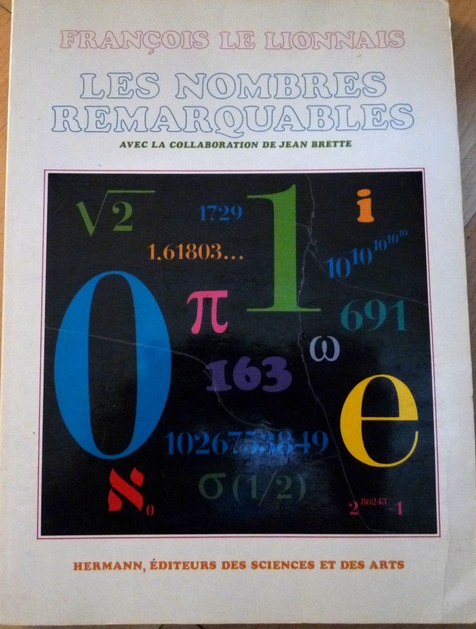As I was preparing the lecture I just gave for the SMO Day, I came back to a book I had loved when I was a kid but which I had not spent much time reading since, François le Lionnais’s Les nombres remarquables, written with J. Brette (this is a title which is surprisingly hard to translate; “Remarkable numbers” doesn’t seem right, because it misses the subtle highlighting Les).

In any case, this is a kind of dictionary of interesting numbers, which was published in 1983. I know there exist a few others, but this is the only one I’ve looked at, so I can’t compare it with them. However, this is definitely a very nice book. Partly this may be due to the fact that le Lionnais (should one say, the author, or the collector?) was not really a professional mathematician (despite what Wikipedia seems to claim in the English article), but a type of renaissance man interested both in sciences in general and a humanist; he was the co-founder (with R. Queneau, the man behind Zazie dans le métro) of the famous Oulipo. However, there is no cute amateurishness in his selection of numbers; of course, he doesn’t disdain curiosities like
843 973 902. The largest number obtained, in the decimal system, as a product of two numbers constructed with all digits from 1 to 9. 843 973 902=9642 x 87531.
but what he (or they) think are the “most interesting numbres” are highlighted with one to three stars, and the next item shows that they know that mathematics is not all cuteness:
898 128 000. *** 27 36 53 7 11. Order of the McLaughlin group, the tenth sporadic group.
There are even a few complex numbers, and some “non-determined finite numbers”. Among the first, I note the following property of
$latex e^{2i\pi /7}=0.999877\ldots + 0.015665\ldots i$
which I didn’t know (or had forgotten): the triples
$latex (a,b,c)=(1,e^{2i\pi /7},e^{6i\pi/7}) \text{ or } (1,e^{2i\pi/7},e^{10i\pi/7})$
are the only triples of (distinct) complex numbers with modulus one such that 0 does not belong to the convex hull of
$latex (a^n,b^n,c^n)$
for any integer n.
Among the non-determined finite numbers, there is the one defined as follows, which I suspect is probably determined now:
$latex N=(-1)^k10^k$
where k is the digit following the first sequence of seven consecutive sevens in the decimal expansion of π. (I think sufficiently many digits have been computed now to determine N).